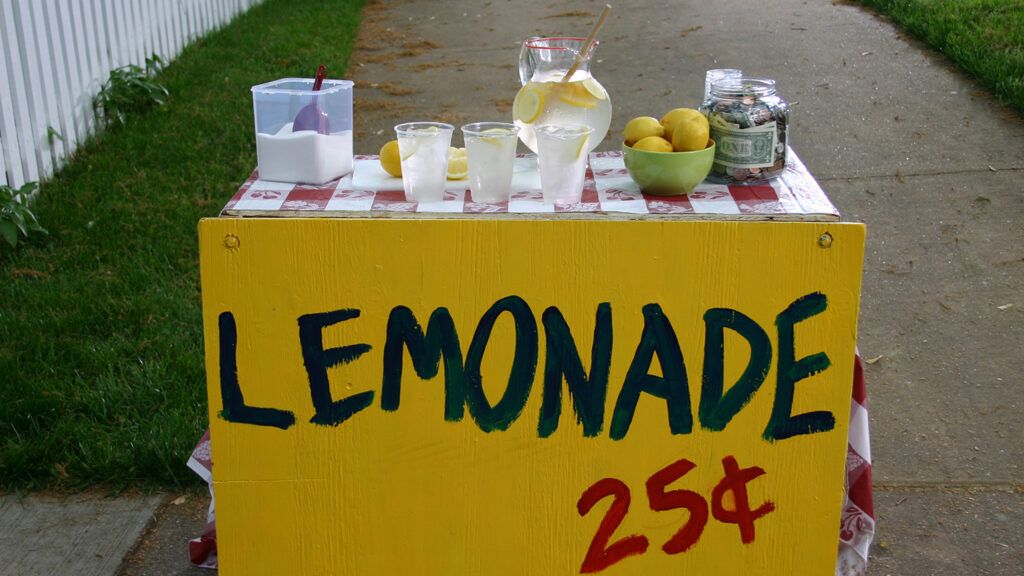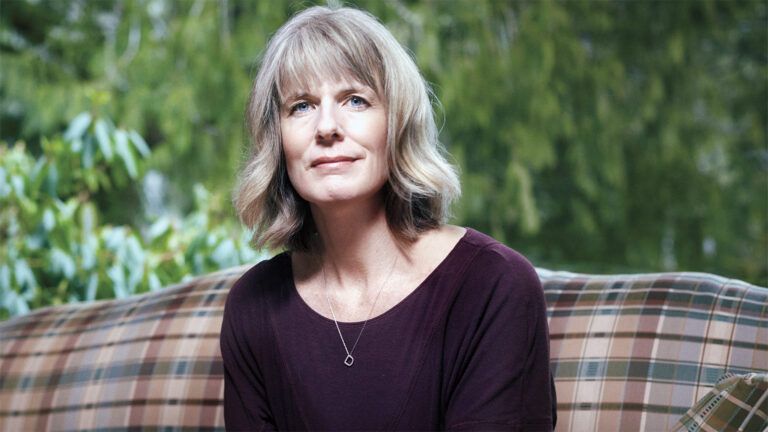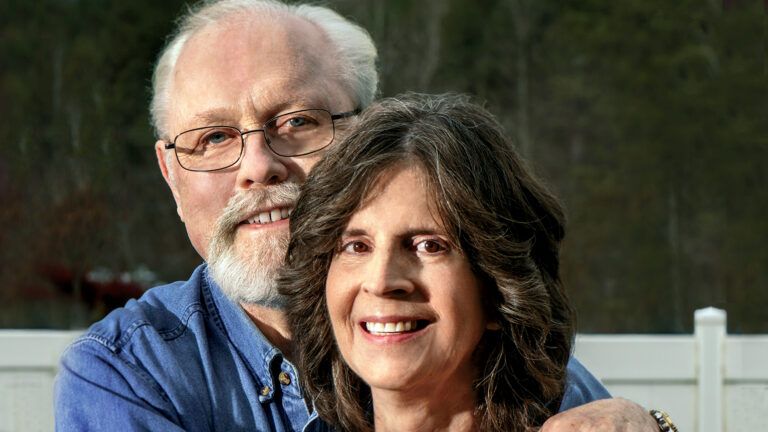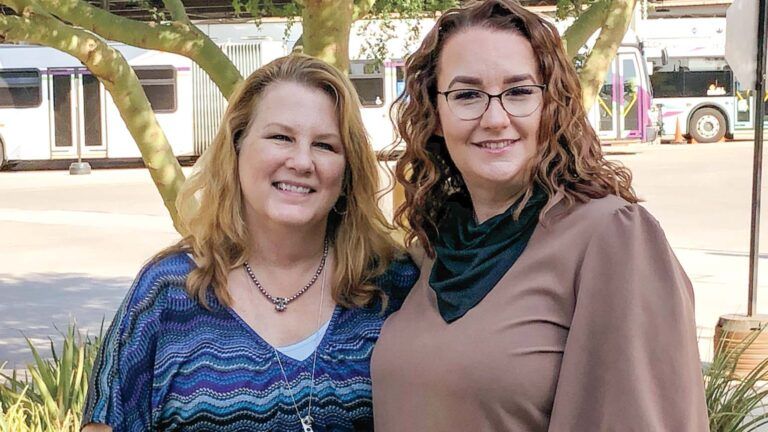“Mom,” my four-year-old daughter, Alex, said on that gray and unpromising January afternoon, “I want to build a lemonade stand.”
Alex and I were on the stem cell transplant ward of the University of Connecticut Health Center in Farmington, Connecticut. As I stood looking out the window at the frozen landscape, I was trying to imagine how all of those bare hopeless trees would look again covered with green.
Alex was in the middle of a five-week stay and was recovering from a stem-cell transplant. She’d battled neuroblastoma pediatric cancer since she was one and had to endure years of chemotherapy and six major surgeries. The stay seemed to be stretching on forever—even more than her hospital stays of days past. Staying positive was hard. So many people had told my husband, Jay, and me that they were praying for a miracle. I wanted to believe a miracle would come. But on a day like this, miracles seemed as far away as the Fourth of July.
“A lemonade stand?” I finally said. “That sounds great, Alex. We’ll have to do that when the weather gets warm.”
“Great, Mom.” Alex snuggled down in her pillow and smiled, as if that one little idea was all she needed. I wished I had that kind of faith.
Over the next few weeks that lemonade stand seemed to come up whenever Alex needed a boost. The idea just seemed to chase away any gloomy feelings.
I always nodded my head, but the more Alex mentioned that stand, the more misgivings I had. A kid setting up a lemonade stand might not sound like a very big deal, but Alex wasn’t an ordinary kid. The thought of her sitting out in front of our house, with a pitcher, some cups and a head full of high hopes, was just too heartbreaking. High hopes, even for something this small, could lead to disappointment. And Alex’s life had seen far too many disappointments already.
In February Alex finally returned to our home just outside Hartford, Connecticut, and life went back to normal—as much as life in a house with a chronically ill child ever can be. The weather warmed, the trees got a hint of green in them and every now and then, almost like a little ritual, Alex would mention the stand.
Then, one day in late June, Alex and I were in the kitchen making some brownies. “Mom? It’s the end of June already and I still haven’t set up my stand.”
I put down the bowl of mix I’d been stirring and looked at my daughter. “Alex,” I said, “why are you so set on this lemonade stand? If there’s something you really need to buy, maybe we can just get it for you.”
Alex fixed me with one of her you-just-don’t-get-it looks. “I’m not keeping the money. I’m giving it to my hospital.”
So that was it. But if anything, it made me even more worried for Alex that she might be disappointed.
“Alex,” I said that night as she was getting ready for bed, “I don’t want you to get your expectations too high about that lemonade stand. You might only end up making a few dollars. Maybe not even that.”
“That’s all right. Everything helps.”
I told our neighbors about the stand and asked them to stop by. I called my sister and asked her to come with her kids.
“Do you mind if I call the Hartford Courant and tell them about it?” my sister asked.
“The Courant? I don’t think this is exactly breaking news. But sure, why not?” Soon after I hung up, the phone rang. It was a reporter from the Courant.
The article about Alex’s lemonade stand came out in Friday’s early edition. At seven o’clock Friday morning a knock on the front door got me out of bed. “I know Alex isn’t having her lemonade stand until tomorrow,” said the woman standing there, “but I’m going away for the weekend, and I just had to make a donation.”
The next day Alex was up extra early. Before 8 she was sitting outside with a folding table and a pitcher of lemonade. In less than an hour the driveway and the street out front were clogged with cars. By 11 a.m. the little toy cash register I’d hoped Alex would be able to coax a few dollars into had been filled and emptied so many times that I’d lost track.
At the end of the day our lawn was a mess, everyone was exhausted and we finally got a chance to sit down with Alex and count how much money she’d made for the hospital. Just over two thousand dollars.
Alex’s idea caught on like wildfire. Soon kids in other towns and other states were selling lemonade to benefit pediatric cancer research. That first newspaper article was followed by dozens more, and then by TV appearances. The more lemonade stands, the more money came in for research. And more research meant more help for kids with cancer.
In the spring of 2001 we moved to Wynnewood, Pennsylvania, because the doctors at Children’s Hospital of Philadelphia were offering what Jay and I saw as the best treatment program for Alex. Of course, the first thing Alex did once we were settled into our new home was set up another lemonade stand.
One day in early 2004 Alex was speaking on the telephone about her lemonade stand. I overheard her say, “This year I’m going to raise one million dollars through my stand for cancer research.” I knew better now than to doubt my daughter. I also knew that the project had become more than just something Alex loved. It was what was keeping her going. But around that time Alex’s health took a sharp turn downward. We went from one experimental drug to another. I watched my daughter grow weaker and weaker, and tried to smile when people told me that they were praying for a miracle.
Alex continued to publicize her lemonade stand almost to the very end of her life, working to the last minute toward that million-dollar goal. But finally, her body, exhausted not only by the cancer but by years of surgeries, began to fail her once and for all. Alex died peacefully on August 1, surrounded by her entire family.
In October 2004, two months after her death, Alex reached her goal of one million dollars. That week, Jay and I decided to devote ourselves to keeping Alex’s lemonade stand going. Jay quit his job and now works for Alex’s project full-time. When I’m not looking after our other three kids, that’s what I’m doing too.
Alex didn’t survive her battle against pediatric cancer, but we did see a miracle—the river of love that has poured into Alex’s lemonade stand from the very first moment she started it. If that’s not a miracle, I don’t know what is.






